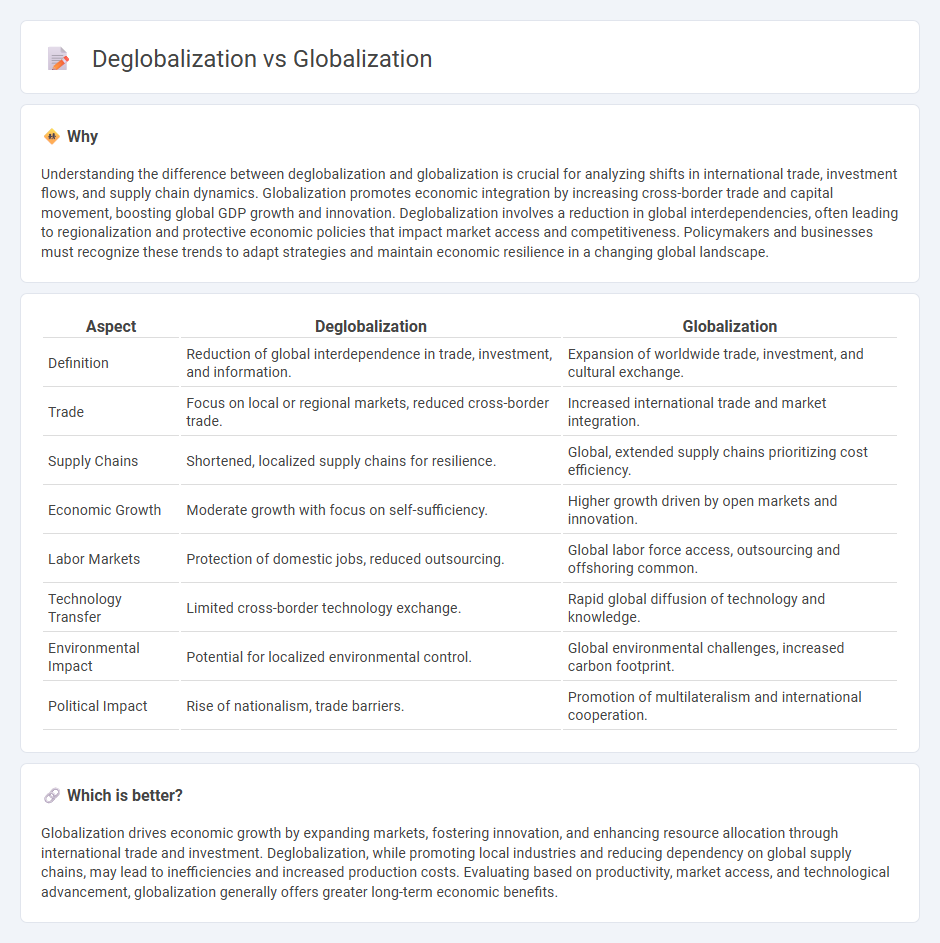
Globalization has driven economic interdependence through expanded trade, investment, and technology exchange, boosting global growth and innovation. Deglobalization, marked by rising protectionism and supply chain reconfiguration, challenges this trend by prioritizing national interests and economic sovereignty. Explore the evolving dynamics shaping the future of the global economy.
Why it is important
Understanding the difference between deglobalization and globalization is crucial for analyzing shifts in international trade, investment flows, and supply chain dynamics. Globalization promotes economic integration by increasing cross-border trade and capital movement, boosting global GDP growth and innovation. Deglobalization involves a reduction in global interdependencies, often leading to regionalization and protective economic policies that impact market access and competitiveness. Policymakers and businesses must recognize these trends to adapt strategies and maintain economic resilience in a changing global landscape.
Comparison Table
| Aspect | Deglobalization | Globalization |
|---|---|---|
| Definition | Reduction of global interdependence in trade, investment, and information. | Expansion of worldwide trade, investment, and cultural exchange. |
| Trade | Focus on local or regional markets, reduced cross-border trade. | Increased international trade and market integration. |
| Supply Chains | Shortened, localized supply chains for resilience. | Global, extended supply chains prioritizing cost efficiency. |
| Economic Growth | Moderate growth with focus on self-sufficiency. | Higher growth driven by open markets and innovation. |
| Labor Markets | Protection of domestic jobs, reduced outsourcing. | Global labor force access, outsourcing and offshoring common. |
| Technology Transfer | Limited cross-border technology exchange. | Rapid global diffusion of technology and knowledge. |
| Environmental Impact | Potential for localized environmental control. | Global environmental challenges, increased carbon footprint. |
| Political Impact | Rise of nationalism, trade barriers. | Promotion of multilateralism and international cooperation. |
Which is better?
Globalization drives economic growth by expanding markets, fostering innovation, and enhancing resource allocation through international trade and investment. Deglobalization, while promoting local industries and reducing dependency on global supply chains, may lead to inefficiencies and increased production costs. Evaluating based on productivity, market access, and technological advancement, globalization generally offers greater long-term economic benefits.
Connection
Deglobalization and globalization are interconnected processes reflecting shifts in global economic integration and trade dynamics. Globalization drives increased cross-border flows of goods, services, capital, and labor, enhancing economic interdependence among nations. Deglobalization represents a partial reversal, emphasizing national economic sovereignty, reshoring industries, and reducing reliance on complex international supply chains to mitigate geopolitical risks and economic vulnerabilities.
Key Terms
Trade Liberalization
Trade liberalization, a central tenet of globalization, promotes the reduction of tariffs and non-tariff barriers to enhance international trade flows. Conversely, deglobalization often manifests through protectionist policies aimed at shielding domestic industries from external competition, thereby reducing cross-border trade activities. Explore the dynamics between these opposing forces to understand their impact on global economic integration.
Protectionism
Protectionism involves government actions and policies that restrict international trade to protect local industries from foreign competition, often through tariffs, quotas, and subsidies. Globalization promotes free trade and economic integration across nations, lowering barriers to increase market access and efficiency. Explore how protectionism shapes the balance between globalization and deglobalization in modern economies.
Supply Chain Integration
Globalization has driven extensive supply chain integration by promoting cross-border collaboration, reducing trade barriers, and streamlining logistics networks. Deglobalization trends, fueled by geopolitical tensions and localized manufacturing strategies, are increasing supply chain fragmentation and emphasizing regional resilience over global efficiency. Discover how these shifting dynamics are reshaping supply chain management approaches worldwide.
Source and External Links
Globalization - Globalization is the process of increasing interdependence and integration among economies, societies, and cultures worldwide, driven by technology, trade, and migration.
What is Globalization: Pros, Cons, and History - Globalization refers to the movement of goods, services, knowledge, and people across borders, reshaping international business, supply chains, and cultural exchange.
What is Globalization? Examples, Definition, Benefits and Effects - Globalization accelerates the exchange and flow of people, capital, technology, and culture around the world, intensifying connections and interactions between different regions and societies.
 dowidth.com
dowidth.com